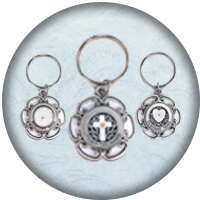DIVINE MERCY THEME IN PAPAL WRITINGS, PART III in the DIVINE MERCY SUNDAY series
Kathy Boh on 23rd Apr 2020
DIVINE MERCY SUNDAY Part III:
DIVINE MERCY THEME IN PAPAL WRITINGS
Divine Mercy has been a recurring theme of recent popes. We take time here today and examine some of their writings. It connects to the Paschal season themes of past writings, and Divine Mercy Sunday, which we just celebrated liturgically.
DIVINE MERCY MEANS GOD’S LOVING MERCY TOWARDS US
John Paul II died on April 2, 2005, on the eve of Divine Mercy Sunday. Pope John Paul II had prepared a [“Regina Caeli”] message for Divine Mercy Sunday, April 3, 2005. Included were the words, “As a gift to humanity, which sometimes seems bewildered and overwhelmed by the power of evil, selfishness and fear,
...the Risen Lord offers his love that pardons, reconciles and reopens hearts and gives peace. How much the world needs to understand and accept Divine Mercy!”[p. 18] 1
“The Servant of God John Paul II had known and personally experienced the terrible tragedies of the 20th century and for a long time wondered what could stem the tide of evil. The answer could only be found in God’s love. In fact, only Divine Mercy is able to impose limitations on evil; only the almighty love of God can defeat the tyranny of the wicked and the destructive power of selfishness and hate. For this reason, during his last visit to Poland (August 17, 2002), he said on his return to the land of his birth:
‘Apart from the mercy of God there is no other source of hope for mankind’[Pope Benedict XVI, April 2, 2008, 3rd Anniversary Mass for St. John Paul’s death] [p.56] 2
Pope Benedict XVI continued the focus on Divine Mercy. “It’s important… to explain that Pope Benedict usually uses ‘God’s mercy’ and ‘Divine Mercy’ interchangeably to refer to the mystery of God’s mercy toward us… [He] speaks of the call to ‘be witnesses of God’s mercy’. In both cases he is speaking of the same reality, whether he calls it ‘God’s mercy’ or ‘Divine Mercy’.” [p.11] 3
Cardinal Christoph Schonborn “presented the idea for the [initial] Congress [World Congress on Divine Mercy] to Benedict in 2006… [O]n April 6, 2008, as president of the Congress, he” spoke of “being witnesses of ‘His immeasurable mercy.’ … ‘Be merciful as your Father is merciful.’ How many times in living and performing simple works of mercy have we been able to experience the closeness of the Lord. ‘The history of the success of Christianity is not a story of military triumphs or political triumphs,’ he continued. ‘It is rather the triumph of living mercy… "[p.140-42] 4
THE PASCHAL MYSTERY AND DIVINE MERCY
“… [Pope] Benedict has always placed mercy—God’s mercy—right at the heart of the paschal mystery… God in His mercy has taken the initiative in saving us through Christ. Our task is to trust in His mercy and be merciful to others ourselves.
Our mercy towards those in need is imperative, but it needs to flow from God’s mercy and grace toward us to have staying power in our lives.” [p.139-40] 5
“The greatest gift of Divine Mercy that each of us has been given is our salvation through the Passion, death, and Resurrection of Jesus Christ. This is the good News of the Gospel that we are impelled to share as witnesses of God’s mercy. This is the main reason why God’s mercy is ‘a source of hope for every person and for the whole world,’ as Pope Benedict puts it…” [p. 45] 6
“…If we want to spread Divine Mercy… this Gospel of Mercy must be our central focus. We should always remember that we are not only called to proclaim it but to live it ourselves.” [p.45] 7
“On Calvary, Divine Mercy manifested his face of love and forgiveness for everyone. In the Upper Room after his Resurrection, Jesus entrusted the Apostles with the task of being ministers of this mercy, a source of reconciliation among men and women.” (Pope John Paul II, April 14, 2004, General Audience). 8
DIVINE MERCY VISION
“Now, in our day, Divine Mercy also refers to a particular message…given to St. Faustina by Jesus in the 1930’s… It is as if God has put a spotlight on our world situation through St. Faustina, emphasizing Divine mercy as an urgent message for our troubled time.” [p.11] 9
“On February 22, 1931, a young Polish nun, Sr. Faustina Kowalska, saw a vision of Jesus with rays of mercy streaming from the area of His Heart… He taught her that His mercy is unlimited and available even to the greatest sinners… On the Sunday after Easter, April 30, 2000 (Mercy Sunday), Sister Faustina was solemnly canonized in Rome by Pope John Paul II. The Pope also established Mercy Sunday worldwide.” 10
“This message and the devotions associated with it call us to trust in Jesus as our merciful Savior, to receive His mercy, and share that mercy with others.”[p.11] 11
ST. JOHN PAUL II
Pope John Paul II visited the tomb of St. Faustina in Poland at the Shrine of The Divine Mercy on June 7, 1997. “During that visit, [he] made these poignant remarks:
‘I come here to commend the concerns of the Church and of humanity to the merciful Christ. On the threshold of the third millennium, I come to entrust to him once more my Petrine ministry—“Jesus, I trust in you!” The message of Divine Mercy has always been near and dear to me. It is as if history had inscribed it in the tragic experience of World War II… This was also my own personal experience’…” [p.131-2] 12
“At the Shrine of the Divine Mercy in Lagiewniki, Poland, on May 27, 2006…
Pope Benedict [stressed] that when we personally trust in Jesus in a difficult situation such as suffering from a sickness, our trust is not passive. Rather, it is a concrete action that involves our exercise of all three of the theological virtues—faith, hope, and love." [p.68]13
TRIUMPH OF GOD’S MERCY
“…[D]uring his General Audience in St. Peter’s Square on October 18, 2006… Pope Benedict” spoke of the “betrayal of Jesus by Judas Iscariot” and how it “reveals that God is ‘rich in mercy and forgiveness.’ “ [p.77] 14 “Pope Benedict… makes clear that Satan is the main adversary working through Judas.” [p.81] 15
“Here, it is helpful to remember the words of St. Paul: ‘For our struggle is not with flesh and blood but with the principalities, with the powers, with the world rulers of this present darkness, with the evil spirits in the heavens’ (Eph 6:12).
With all this in mind, we need to realize that we are engaged in spiritual warfare against Satan when we see evil at work in our lives, in the lives of others, and in our world. Jesus has the victory and is, indeed, seated at God’s right hand in glory. Here on earth, though, Satan seeks to oppose Him at every turn and tempts human beings to join him.” [p.82]16 (More on Spiritual Warfare can be found in the articles listed below.) 16b
“Jesus knows well that one can’t dialogue with Satan, because he is so cunning. For this reason, instead of dialoging, as Eve did, Jesus chooses to take refuge in the Word of God and to respond with the power of this Word.
Let us remind ourselves of this in the moment of temptation… not arguing with Satan but defending ourselves with the Word of God. And this will save us…
[When] Satan [gets] involved… what seemed at first like a calm trickle of water turn[s] into a flood of water. In this way, the temptation grows, infects others, and justifies itself.” [p.12-13] 17
Pope Benedict says that “God’s mercy is intended for all sinners… God alone is qualified to sit in judgment over human hearts… [I]n our battle against evil, we should be mindful that Satan, not human beings, is our main adversary. Therefore, we should engage in spiritual warfare for the salvation of souls.” 18
What we need to do goes beyond the “works of mercy” and into the realm of the Spirit of God and prayer—both for God’s mercy and, importantly, against destructive evil powers at work among us.
We often hear about “spiritual warfare”, and have seen in references above some differences in living in the spirit of the world and the devil, and of living according to the (Holy) Spirit of God. Frequently, we find ourselves ignorant of just what that means or entails. The following portrays what the scriptures describe as “spiritual warfare” tactics and weapons. These scriptures shed light on what enables us to live by the Spirit of God, and fight against unholy spirit influences and powers.
Continuing the scripture verses referring to Pope Francis’ [footnote 17] and Pope Benedict’s [footnote 18] comments about spiritual warfare [above], we quote Eph. 6:10 and II Cor 10:4, respectively:
“Finally, draw your strength from the Lord and from his mighty power…” and “…[F]or the weapons of our battle are not of flesh but are enormously powerful, capable of destroying fortresses…”
And continuing the Ephesians verses: “Put on the armor of God so that you may be able to stand firm against the tactics of the devil. Therefore, put on the armor of God that you may be able to resist on the evil day and, having done everything, to hold your ground.
So stand fast with the belt of truth, clothed in righteousness as a breastplate, and your feet shod with the gospel of peace. In all circumstances hold faith as a shield, to quench all the flaming arrows of the evil one. And take the helmet of salvation and the sword of the Spirit, which is the word of God. With all prayer and supplication, pray at every opportunity in the Spirit...” [Eph.6:11, 13-18]
ST. PATRICK LIVED MERCY AND “SPIRITUAL WARFARE”
One of many saints who lived and continually evidenced a rich flow of the Spirit of God throughout His ministry was St. Patrick.
Just last month, we wrote about St. Patrick’s amazing life. Throughout the research and writing of this particular blog, I cannot help but think of St. Patrick and the steadfast example of mercy and the power of God that he exhibited in his life in Ireland.
His heart was full of the Lord and overflowing with God’s mercy, as Patrick—with enormous passion and determination—traveled through Ireland.
He wrestled against the very real demonic powers every step of the way, being so like Christ in his motivation: desiring to see this Celtic people set “free”— freed from the bondages of idol worship and demonic oppression through the powerful political and religious control of the Druid priests. He worked and traveled and spoke and prayed in order to see them come into the kingdom of God.
St. Patrick’s life conveys to us that we do not have to be a first century apostle to show forth the power of the Holy Spirit and win decisively against evil powers around us. (See our posted blog article at trinitychurchsupply.com/blog. The date posted was 3-12-2020 for Part I and 3-13-2020 for Part II for THE SURPRISING ST. PATRICK. Part II also included his powerful prayer, "St. Patrick's Breastplate.")
EXPERIENCE GOD’S MERCY
“Pope Benedict develops this theme further. ‘To be able to perceive his mercy it suffices to have a heart that is alert. We are excessively inclined to notice only the daily effort that has been imposed upon [us] as children of Adam.’ [p.25] … 19 [In other words,]
...if we don’t keep our eyes on the Lord and His mercies, we become weighed down by our sinful tendencies as children of Adam. As a result, our spiritual vision becomes clouded, and we miss the blessing—the sense of gratitude and joy—that God intended for us.”[p.26] 20
“At the end of his General Audience, Pope Benedict encourages us to ‘never despair of God’s mercy,’ because the love and mercy of God will always win out in the end…. [p.83] 21 Pope Benedict is saying that Judas, in a mysterious way, advanced God’s ultimate purpose, which was and is to save us from our sins.
Thus, God in Christ thwarted the evil designs of Satan and of Judas in achieving precisely the good of our salvation! Inspired by this triumph of God’s mercy over evil, let’s decide anew to place our complete trust in Jesus, our Redeemer.” [p.84] 22
TRUST IN GOD’S MERCY
“God’s mercy is intended for all sinners… God alone is qualified to sit in judgment over human hearts…” [p.86] 23
[Pope Benedict] tells us :“[I]t is God’s mercy and not our own, which is a ‘source of hope for every person and for the whole world.’ Here, Pope Benedict is not simply splitting hairs. He is clearly placing the emphasis on God’s mercy toward us in our need, as the starting point.” [p.139] 24 [to repeat:]
“ … God in His mercy has taken the initiative in saving us through Christ. Our task is to trust in His mercy and be merciful to others ourselves. This does not belittle human mercy at all. Remember Benedict’s insightful image of the Good Samaritan being ‘struck in his soul by the lightning flash of mercy.’ Our mercy towards those in need is imperative, but it needs to flow from God’s mercy and grace toward us to have staying power in our lives.” [p.139-40] 25
TRUST IN JESUS
Even our doubts, fears, and incomplete trust—when surrendered to Christ and put under His blood-bought grace— can experience the greatness of His mercy and cleansing. Isaiah said, “Our just deeds are like polluted rags” [Isa 64:5]… But He can make up the difference for our failings.
It is His perfect righteousness, and not our own, on which we depend and lean, His price paid. Like the caring and watchful parent, God seeks (as the perfect parent/ father) to make up the difference between what we can be and do—and what we cannot/ are not—at any given stage of growth... when we seek to follow Him and obey Him with all of our hearts. “Cast all your worries [cares] on Him for He cares for you.” [1Pet 5:7]
“Pope Benedict [stressed] that when we personally trust in Jesus in a difficult situation such as suffering from a sickness, our trust is … a concrete action that involves …faith, hope, and love.” [p.68] 26
“… [T]he Divine Mercy authority Fr. George W. Kosicki, CSB, [from Why Mercy Sunday?, co-authored with David Came]: ‘Trust is our faith, hope and love in action. Trust is an action that takes in all three. It combines the past focus of our faith in what Jesus did, the present ‘now’ dimension of His love for us, and the future dimension of hope because of what He has prepared for us in heaven.
Trust, then, means to believe in Jesus, to love Him, and to hope in Him. It means to be totally absorbed in Jesus as our Lord and Savior, to rely completely upon Him. We desire to have His mind and thoughts, His will, His power, His Heart, and His total trust in the Father. To sum up, when we really trust in Jesus, we can say with the Apostle Paul: ‘It is no longer I who live but Christ who lives in me’. “(Gal 2:20) [p.69]27
“Christ did not cast himself down from the pinnacle of the Temple. He did not leap into the abyss. He did not tempt God. But he did descend into the abyss of death, into the night of abandonment, and into the desolation of the defenseless. He ventured this leap as an act of God’s love for men. And so he knew that, ultimately, when he leaped he could only fall into the kindly hands of the Father. This brings to light the real meaning of Psalm 91, which has to do with the right to the ultimate and unlimited trust of which the Psalm speaks:
If you follow the will of God, you know that in spite of all the terrible things that happen to you, you will never lose a final refuge. You know that the foundation of the world is love, so that even when no human being can or will help you, you may go on, trusting in the One who loves you.(Jesus of Nazareth, Doubleday, 2007, pp.37-38, emphasis in original).” [p.74] 27
“…Pope Benedict told us on Divine Mercy Sunday 2007: ‘Peace is the gift that Christ left his friends (cf. Jn 14:27) as a blessing destined for all men and women and for all peoples. It is not a peace according to a ‘worldly’ mentality, as an equilibrium of forces, but a new reality, fruit of God’s love, of his mercy.
It is the peace that Jesus earned by the price of his Blood and communicates to those who trust in him." [pp.66-7] 29
SHOWING THE MERCIFUL LOVE OF GOD
“The Church’s first truth is the love of Christ. The Church makes herself a servant of this love and mediates it to all people: a love that forgives and expresses itself in the gift of oneself. Consequently, whenever the Church is present, the mercy of the Father must be evident. " [blogger’s italics] 30
“Merciful Like the Father, therefore, is the ‘motto’ of this [2015-16 Jubilee Holy Year of Mercy]. In mercy, we find proof of how God loves us. He gives his entire self, always, freely, asking nothing in return. He comes to our aid whenever we call upon him…” 31
“Let us not forget the words of Saint John of the Cross:
‘as we prepare to leave this life,
we will be judged on the basis of love’…
The Church feels the urgent need to proclaim God’s mercy. Her life is authentic and credible only when she becomes a convincing herald of mercy. She knows that her primary task… is to introduce everyone to the great mystery of God’s mercy by contemplating the face of Christ.
The Church is called above all to be a credible witness to mercy, professing it and living it as the core of the revelation of Jesus Christ. From the heart of the Trinity, from the depths of the mystery of God, the great river of mercy wells up and overflows unceasingly. It is a spring that will never run dry…” 32
GOD’S MERCY—NOT SPENT!
“The Lord’s acts of mercy are not exhausted, his compassion is not spent; they are renewed each morning—great is your faithfulness!”
[Lam 3:22-23]
God's acts of mercy are so far beyond our comprehension, so let us simply be more intent on receiving the abundant mercy it pleases the Father to give, and worry less about understanding the mind-boggling generosity of our God!
Let us not miss “so great a salvation” that our Savior so willingly paid for with inscrutable suffering… Let us make sure—in each of our own lives—that this “Gift card” we (each, personally) have been given, does not remain unredeemed and unspent. The price has been fully paid!
Mercy was bought at the price of the life and death of the only truly Just One who ever lived… the One whose perfect Justice was triumphantly trumped by the vast richness of His mercy… the Lord Jesus Christ.
Let us gladly throw ourselves into the heart of this vast and willing mercy of God… continually…
Our next few blogs will be a four-part series on Pentecost and the Holy Spirit.
It includes:
Part I: PENTECOST: ROOTS, PRICE, PROMISE AND WHAT HAPPENED.
Part II will continue with WHAT DIFFERENCE DOES PENTECOST MAKE?
… looking at Holy Spirit power manifested, effects, repercussions, gifts and fruit. We will examine being called, sent, and going beyond human limits.
Part III will explore THE HOLY SPIRIT SPEAKS: HOW SHALL WE RESPOND? We will explore receiving Him, how to respond, letting Him speak, God’s glory, the Holy Spirit now, the days ahead, and a Pentecost way of life.
Part IV: COMING TO THE LIVING WORD OF GOD… some life-giving perspectives... scripture brought to life by the Holy Spirit.
FOOTNOTES:
- 1.POPE BENEDICT’S DIVINE MERCY MANDATE, by David Came, Marian Press, Stockbridge, MA 01263
- 2.Ibid.
- 3.Ibid.
- 4.Ibid.
- 5.Ibid.
- 6.Ibid.
- 7.Ibid.
- 8.BRINGING LENT HOME WITH ST. JOHN PAUL II, by Donna-Marie Cooper O’Boyle, 2014, Ave Maria Press, Notre Dame, Indiana
- 9.POPE BENEDICT’S DIVINE MERCY MANDATE, by David Came, Marian Press, Stockbridge, MA 01263
- 10.THE MESSAGE OF MERCY. The “Message of Mercy” pamphlet is distributed by Marian Fathers in the United States, who have a center in Stockbridge, Massachusetts
- 11.POPE BENEDICT’S DIVINE MERCY MANDATE, by David Came, Marian Press, Stockbridge, MA 01263
- 12.Ibid.
- 13.Ibid.
- 14.Ibid.
- 15.Ibid.
- 16.Ibid. 16b More on Spiritual Warfare can be found in PART II of this series: MERCIFUL LOVE AT THE HEART OF THE TRINITY—Seeing it, Receiving it and Walking in it [posted 4-22-20] and [on 3-13-20] THE SURPRISING ST PATRICK, PART II: VICTORY IN SPIRITUAL BATTLE, and ST PATRICK’S BREASTPLATE
- 17.WHO IS THE DEVIL? WHAT POPE FRANCIS SAYS by Rev. Nick Donnelly
- 18.POPE BENEDICT’S DIVINE MERCY MANDATE, by David Came, Marian Press, Stockbridge, MA 01263, p. 86
- 19.Ibid.
- 20.Ibid.
- 21.Ibid.
- 22.Ibid.
- 23.Ibid.
- 24.Ibid.
- 25.Ibid.
- 26.Ibid.
- 27.Ibid.
- 28.Ibid.
- 29.Ibid.
- 30.“Introduction: An Invitation to Mercy, by Pope Francis” from BEAUTIFUL MERCY, by Dynamic Catholic, p. 15
- 31.Ibid.
- 32.Ibid, p. 17
With rare exception, the words in "bold" print were emboldened by the blog author, for purposes of summary and emphasis.










